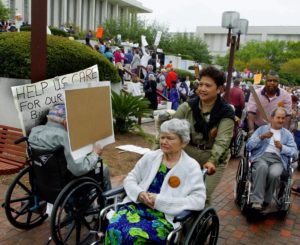A Third of Those Born in the U.K. in 2015 Will Develop Dementia, Study Predicts
The charity Alzheimer’s Research UK is warning of a national health crisis, predicting that one in three people born in the country this year will develop dementia. Ann / CC BY-SA 2.0
Ann / CC BY-SA 2.0
The charity Alzheimer’s Research UK is warning of a national health crisis, predicting that one in three people born in the country this year will develop dementia.
Dementia affects 850,000 people in the U.K. The most common form is Alzheimer’s disease.
The research group said age was the biggest factor in the development of dementia.
The Guardian reports:
As people live longer than ever before, the numbers with dementia will rise. The latest analysis, commissioned by the charity and carried out by the Office of Health Economics, was released to mark World Alzheimer’s Day.
It showed 27% of boys born in 2015 will develop the condition in their lifetime, alongside 37% of girls. Previous research from the same team has estimated that the development of a drug that could delay the onset of dementia by five years would cut the number of cases by a third. …
George McNamara, head of policy at Alzheimer’s Society said: “Dementia is already the biggest health challenge this country faces. It costs the UK in excess of £26bn, which equates to £30,000 a person with dementia – more than the cost of either cancer or heart disease. Today’s stark finding should galvanise the government, and us all, into action.”
Read more here.
— Posted by Alexander Reed Kelly.
Your support is crucial...As we navigate an uncertain 2025, with a new administration questioning press freedoms, the risks are clear: our ability to report freely is under threat.
Your tax-deductible donation enables us to dig deeper, delivering fearless investigative reporting and analysis that exposes the reality beneath the headlines — without compromise.
Now is the time to take action. Stand with our courageous journalists. Donate today to protect a free press, uphold democracy and uncover the stories that need to be told.






You need to be a supporter to comment.
There are currently no responses to this article.
Be the first to respond.